We've been honored to host the legendary Jeff Mills twice this year to Sullivan Room. His October 17th visit was another mind-melting set of tripped out, custom-made techno. Check out picture gallery from the night - with gallery #1 and gallery #2 on Facebook.
He’s internationally known as one of techno music’s most important pioneers. But if you took a closer look at his myriad projects and achievements, it’s clear that Jeff Mills is much more than just a DJ and music producer. From his avant-garde fashion boutique in Chicago, Gamma Player, to his “Blue Potential” collaboration with the Montpellier Philharmonic Orchestra, to his highly conceptual live events in Japan (including the current “Sleeper Wakes”), Jeff Mills is a provocateur who has challenged the limits and perceptions of electronic music throughout his career.
Yet despite his wide-ranging array of interests, Mills is still very intensely focused on his DJing. After an awe-inspiring June debut for Basic NYC, Mills will be back at the Sullivan Room on Saturday, October 17th, again challenging American partygoers with the concept of “And What About the Truth.” He took a moment to discuss the idea, as well as his own thoughts on what technology means to DJing, in this Q&A.
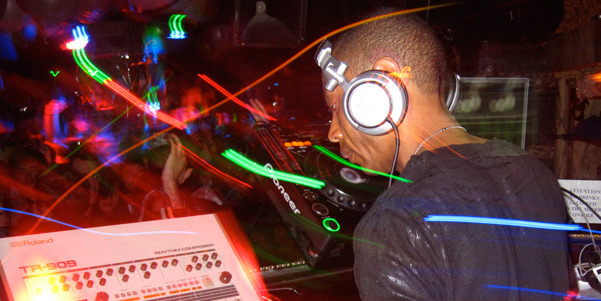
At this point in your life, you’ve done so many things outside of just being a DJ. Where do you still see yourself as a DJ – how important is it to what you are trying to do as an artist and a musician?
As I try to broaden my options on what to make music for, I see my role as a DJ as one of the last and final stages before the idea/concept reaches the people. At this point, I can never retract or retouch the music again because it bares the original and first thought, so its really important to me that the finished product is exactly what I’m trying to say. The period before finally releasing a record/CD can be very lengthy. What I release, not necessarily do, as an artist is crucial. Every 12’” vinyl, CD, DVD are footsteps that can be followed/measured by others. I believe it is with these footsteps that people decide whether it’s worth it to them on whether they want to continue to follow or turn away so, I want to at least, make each step memorable in some way.
You’re certainly not someone who is afraid to take risks and chances in what you do. Where did this philosophy come from, and has it always been something you’ve pursued? Or is it only something you’ve been more comfortable with as you’ve become a very established artist?
I don’t really know. As a child, I was rarely afraid of anything or anybody. Among my friends, I was mostly the one that did it first. It often resulted in spilling more blood, having more bruises or if successful, learning something quicker.
When it came to DJing, I practiced all the time to learn techniques and tricks. Watching and listening to other DJs for hours and hours. I think it has to do with the fact that I had mostly friends around the same age and we were quite competitive. I don’t think I’ve ever become totally confident as a DJ/musician because iit seems to be a long learning process. I think the moment I feel so confident about it, its probably time for me to seriously think about how I got this way, as it might not be challenging anymore.
Do you ever worry about how something is going to be received? That your audience might not really appreciate what you are trying to do with a project?
I used to, but not anymore. I believe that the response of an audience or listener is just a snapshot in time. That if I applied the same music at a different time, there is a chance that the response could be different. What an audience understands and doesn’t understand depends on their mind set, atmosphere/location, etc. Some of the music I made on Axis wasn’t made for that particular time, but for a time in the future. Things like: Growth 12″, Tomorrow EP, Expanded EP, One Man Spaceship and a few others.
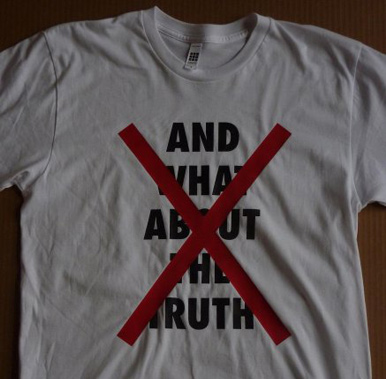
For the last two years, your American DJ sets have been under the heading “AND WHAT ABOUT THE TRUTH.” How did this project come into being, and why is it strictly for the American audience?
“And What About The Truth” was dedicated for Americans because I think we live very complex lives compared to other industrialized countries. We’re a country with very little civil security, a lack of individual responsibility, an apparent and growing lack of respect for others and what they believe, and a notion that what we believe is a majority consensus that is the absolute truth. Could there be a chance that Americans are not as educated and advanced about life as we think we are? Perhaps Americans talk more then we listen. Maybe we talk more to make ourselves feel more educated. Whatever the case, I think that by using the advertising of parties and releases with such a title makes people think about it, the subject of truth.
It was clear when you came to Sullivan Room in June that you had a put a lot of preparation into the night. How much time do you spend making custom music for each night, and why is this important for you to do? Why not just focus on your existing library of music?
I typically create about six new tracks, specifically made for each party, providing that I can get to Chicago or Berlin to make them. “The Drummer”, my most recent 12” vinyl, was a batch that I made in Berlin for a party in Spain. A lot of music is made for special tasks, not for official release, so the tracks only last one or two minutes. I make special things because I know the people are listening much more closely than in previous years. I believe the people that have continued to follow Techno Music today are the ones that really support and deeply understand it. I’m trying to put as much feeling and meaning into the music as possible, and these feelings can’t wait until I press it to vinyl or CD.
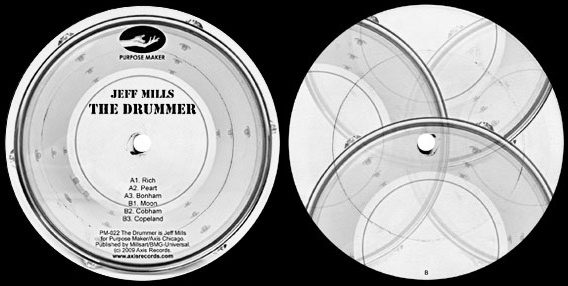
You’ve always had a special connection with New York, back to your Limelight residency in 1991. I’m curious about how much has changed to you about the city, nightclub-wise, in the years since that you’ve been coming back. And similarly, what has been consistent?
New York City is special. I think because of the history, the role New York City plays in America, the mixture of people and other extraordinary characteristics creates a climate where anything can happen on a grand scale. Like London, Paris, Tokyo, Rome and other metropolis’ around the world, they are incubators for high and advanced thinking…..and then action. In 1991, I witnessed these instances numerous times. It taught me a lot. One thing that is consistent is the general thinking that if it makes it to NYC, then it must be interesting or worth the time to experience. This may or may not be true, but I think it’s the general assumption. So, I try to prepare something special every time I’m invited.
You’ve said that if you look at the industry and where it is heading, DJs themselves won’t be needed anymore. Do you not think that crowds and clubs will still crave that connection, the presence of having an actual DJ in the room?
Yes, I think that the way DJs are using technology to replace a lot of things that were done manually, the Electronic Music Instrument makers are being inspired to advance the gear/software to delete the person altogether. The lack of using headphones takes away pre-cueing for mixing; using computer keyboards takes away touching/affecting the disc – giving the programming a less human feel; software so advanced that even the user doesn’t thoroughly use it. All of these so-called “advances” are evolving, while the creative aspects become less relevant, less meaningful, and probably less appealing to the listeners. I think the need to have a special and extraordinary experience is more important to the crowds then it is to see a DJ using the same computer we use in any office atmosphere. I think it’s not just the computer, it’s coupled with the lack of true entertainment.
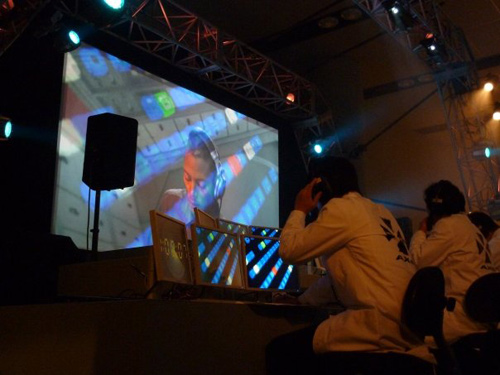
Is your project “The Sleeper Wakes” a way to test this theory out? Having remote transmissions from Chicago to the club in Japan? Could you see this as being some kind of future way of performing, where a DJ is performing through some kind of uplink?
The Sleeper Wakes Project has been in process for about four years now. It will conclude in Tokyo. Mainly, it’s about using silence or absence (time) to search out new ways to make Electronic Music. I haven’t been to play in Japan in four years. In this time, I’ve been making music only to be played for my return on New Years Eve 2010 at the Club Womb. Six hours worth of music. The remote transmissions are because I’m not to physically be in Japan until then, so we’re discovering new ways to communicate. As a result, we’ve come up with some interesting ways to do this.
Tell us a little about “The Sleeper Wakes” and how you developed it. How do you flesh out these projects from ideas into actually executing them?
The Sleeper Wakes and other projects we’ve made just require a lot of thinking, time to prepare and the cooperation from others to plan. Money is always a factor, but there are always alternatives that can be adopted. The most difficult part is thinking about how something could be made into reality. Practical matters. In my mind, most – if not all – Techno Music parties should be pre-thought and planned to create something different and special for the people. Not just rely on what the DJ is playing, a few flashing lights and a tiny video screen that nobody notices. If at all possible, it should be special. Otherwise, people will search for that special atmosphere elsewhere.
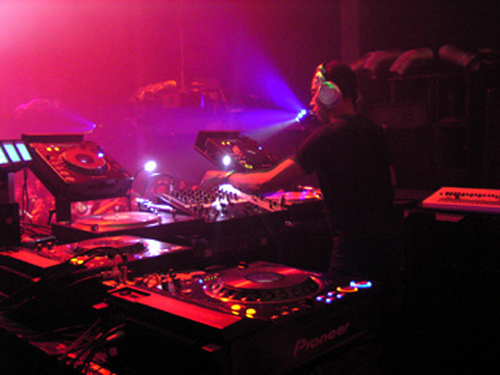
Do you ever see yourself staging something similar to “The Sleeper Wakes” or “One Man Spaceship” here in the US? What would it take for you to try and create an experience like that?
I could not see it possible in the US because of the lack of appreciation people have for what Techno Music is and what it attempts to do. It appears that in the minds of most people that play Techno Music, organize Techno Parties/events, write and critique Techno Music for magazines and web sites, they believe that we are all doing the best we can. I do not believe this, and luckily for some people in Japan that believe the same way, I’m able to create complex and detailed projects like Contact Special, One Man Spaceship and The Sleeper Wakes.
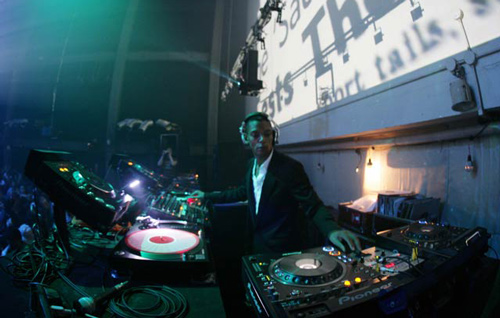
So many DJs these days have moved to a digital platform – whether that’s Ableton, Traktor, Serato. Yet you are still very much playing with vinyl and CDs. Have you ever considered switching things up? Lots of DJs tout the creative possibilities of digital, so it seems like something that you would be interested in.
Anything that takes away my physical participation in the role of Djing, I’m not that interested in. I still believe that it’s important for the listener to understand my physical capacity, even if it’s not as perfect and precise as what a computer and software can do. I’m not sure, but I’m willing to bet that if most people that come to Dance Parties around the world really understood how the music is being played for them, I don’t think they would completely agree with this. The general thinking is that a DJ mixes music. If it were understood that the software is now mixing it and the DJ pretends to do this by just touching the knobs of the mixer, people would be upset and could be begin to ask what they’re paying admission for.
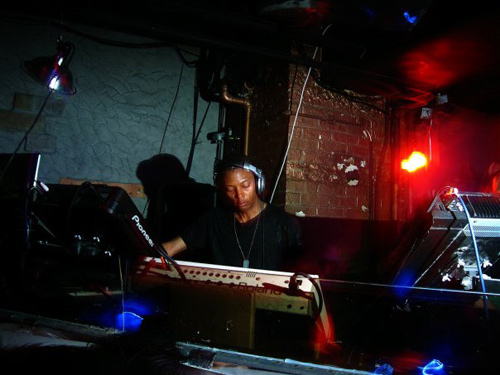
Both you and Axis keep coming up with new projects and new ideas to present to the audiences. Where are you getting your inspiration from these days, and what can we look forward to in the future from you?
We get our inspirations from many things. For instances, a lot of people are looking at the year 2012 as the Second Coming of Jesus and the End of Days. As obscure as it may be, I think its fantastic material in which to create music for. Space Travel, planets, different worlds are always attractive. The Cycles of Time or what we call the Future is always interesting to discuss, calculate and predict.






